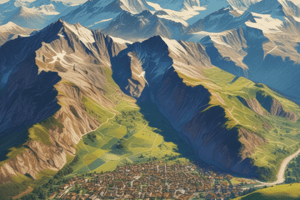Podcast
Questions and Answers
Which peak in the Alps is the highest, reaching 4,810 meters above sea level?
Which peak in the Alps is the highest, reaching 4,810 meters above sea level?
- Eiger
- Jungfrau
- Matterhorn
- Mont Blanc (correct)
What is the approximate length of the Alps mountain range?
What is the approximate length of the Alps mountain range?
- 750 kilometers
- 1,200 kilometers
- 1,200 miles
- 750 miles (correct)
What wildlife can be found at lower elevations in the Alps region?
What wildlife can be found at lower elevations in the Alps region?
- Penguins
- Giraffes
- Ibex and chamois (correct)
- Polar bears
Which plant thrives in high-altitude environments in the Alps?
Which plant thrives in high-altitude environments in the Alps?
What historical role did the Alps serve in the past?
What historical role did the Alps serve in the past?
Which city marks the northern endpoint of the Alps mountain range?
Which city marks the northern endpoint of the Alps mountain range?
When was the first successful ascent of Mont Blanc?
When was the first successful ascent of Mont Blanc?
Which activity is NOT mentioned as a popular outdoor pursuit in the Alps?
Which activity is NOT mentioned as a popular outdoor pursuit in the Alps?
What challenges do the Alps face due to climate change?
What challenges do the Alps face due to climate change?
What kind of organizations have invested resources in research, conservation, and sustainability initiatives in the Alps?
What kind of organizations have invested resources in research, conservation, and sustainability initiatives in the Alps?
What is the main message regarding the Alps in the text?
What is the main message regarding the Alps in the text?
What can be inferred about the region's ecosystem from the text?
What can be inferred about the region's ecosystem from the text?
Flashcards are hidden until you start studying
Study Notes
Discovering the Majestic Alps
Spanning across eight countries in a breathtaking arc, the Alps boast a rich history, diverse wildlife, and colossal natural beauty. This iconic mountain range, stretching roughly 1,200 kilometers from the Mediterranean Sea in the south to the Swiss city of Basel in the north, is a testament to the grandeur of Mother Nature.
Geography and Size
With a length of approximately 750 miles, the Alps are the highest and most extensive mountain range in Europe. They cover an area of about 70,000 square kilometers, with their highest peak, Mont Blanc, reaching a staggering 4,810 meters (15,782 feet) above sea level. The range is divided into several subranges, including the Western and Eastern Alps, with the main peaks concentrated in the central parts.
Climate and Ecosystem
The Alps' diverse geography forms a variety of climates and ecosystems. At lower elevations, the region is home to numerous alpine meadows and forests, while the higher areas are blanketed in glaciers and snowfields. As a result, the flora and fauna vary greatly. Common animals include ibex, chamois, and red deer, while plants such as edelweiss and alpine gentian thrive in the high-altitude environments.
Human History
For centuries, the Alps have been inhabited by various populations. In times past, the region served as a significant trade route, and numerous fortifications and structures were built to protect towns and routes. Remnants of Roman roads, medieval castles, and towns can still be found today, providing a glimpse into the history of this vast mountain range.
Alpinism & Tourism
The Alps have long been a magnet for mountaineers and adventurers. The first successful ascent of Mont Blanc occurred in 1786, while the first winter ascent of the Eiger was accomplished in 1938. Today, the region remains a popular destination for outdoor enthusiasts, with millions of visitors coming to hike, ski, and explore the beauty of the mountains each year.
Environmental Challenges
The Alps are not immune to the impacts of climate change, and they face challenges such as shifting habitats, reduced snowpack, and increased erosion. These changes, in turn, have implications for the region's ecosystem, wildlife, and tourism industry. As a result, government agencies, non-profit organizations, and private companies have invested significant resources in research, conservation, and sustainability initiatives to protect this iconic mountain range for future generations.
The Alps are a truly remarkable natural wonder that has captivated the imagination of explorers, artists, and adventurers for centuries. From the heights of Mont Blanc to the quaint villages nestled in the valleys, this iconic mountain range offers something for everyone to enjoy. As we continue to learn more about the Alps and their inhabitants, we are reminded of the beauty and fragility of our natural world. It is our responsibility to preserve and protect the Alps for future generations to come.
Studying That Suits You
Use AI to generate personalized quizzes and flashcards to suit your learning preferences.



